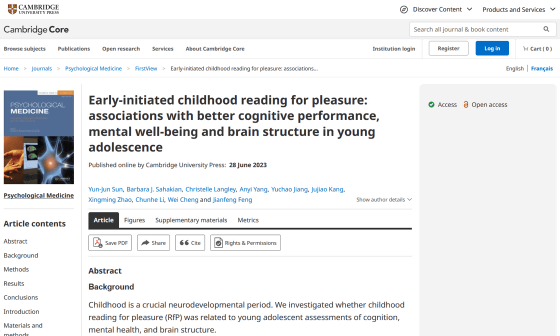The possibility that ``reading'' can cancel out the negative effects of poverty on children's brains

It is known that children's brain development is influenced by the environment in which they are born and raised, and previous research has shown that childhood poverty has
Early-initiated childhood reading for pleasure: associations with better cognitive performance, mental well-being and brain structure in young adolescence | Psychological Medicine | Cambridge Core
https://www.cambridge.org/core/journals/psychological-medicine/article/earlyinitiated-childhood-reading-for-pleasure-associations-with-better-cognitive-performance-mental-wellbeing-and-brain-structure- in-young-adolescence/03FB342223A3896DB8C39F171659AE33

Poverty is linked to poorer brain development – but reading can help counteract it
https://theconversation.com/poverty-is-linked-to-poorer-brain-development-but-reading-can-help-counteract-it-208966
Early childhood is a critical period in brain development, and healthy brain development is associated with better mental health and cognitive performance in adolescence and adulthood, as well as higher educational attainment. Higher household income during childhood has been found to be associated with better scores in language, working memory, and social and emotional information processing, and the cerebral cortex is larger in people of higher socio-economic status than in poorer people.It has been reported that it has become thicker.
The relationship between socio-economic status and cognitive ability is particularly strong in economically disadvantaged families, and small differences in income can make a big difference in brain development among children from low-income families. On the other hand, children from high-income households seem to have only a small effect on brain development even if their incomes differ by the same amount. There is also research showing that ``giving monthly money to low-income mothers changes infant brain development.''
Research shows for the first time that poverty affects child development - GIGAZINE

In a new study, Barbara Sahakian , professor of clinical neuropsychology at the University of Cambridge, and her colleagues have found that ``reading for pleasure from an early age'' is important in finding ways to reduce the negative effects of poverty on brain development. We investigated the impact.
Sahakian and his team analyzed data from a project called Adolescent Brain and Cognitive Development (ABCD), a long-term study investigating children's brain development and health in the United States. More than 10,000 children from different ethnicities and socio-economic statuses participated in the ABCD project and were interviewed to find out whether they had read at an earlier age than when the survey was conducted between the ages of 9 and 13. It also included data on cognitive ability, mental health, and brain development.
Analysis of the data showed that about half of the children started reading at an early age, but the remaining half either had no experience reading at an early age or started reading at a later age. Children who read in early childhood scored better on comprehensive cognitive ability tests, had better academic performance, had fewer mental health problems, and spent less time on electronic devices. Did.
'Our study showed that reading in early childhood is beneficial regardless of socioeconomic status, and the effects of reading were not dependent on parents' years of education,' Sahakian et al. 'It may be beneficial regardless of a child's initial level of intelligence.'
They also found that children who read for pleasure had greater cortical surface area in several brain regions associated with cognitive ability and mental health. Because this was true regardless of socio-economic status, the research team said, ``These results suggest that reading for pleasure during early childhood may be an effective intervention to counteract the negative effects of poverty on the brain.'' I am,” he claimed.

According to the research team, language learning, including reading and discussing books, is an important component of healthy brain development. Additionally, language learning is said to be an important component of various cognitions, including cognitive executive functions such as memory, planning, and self-control, as well as social intelligence.
'There are many reasons why poverty negatively impacts brain development, so a comprehensive and holistic approach is needed to improve outcomes,' Sahakian et al. 'While we will never be able to fully address the impact on children, we offer simple ways to improve children's development and talent.'
Related Posts:
in Science, Posted by log1h_ik







